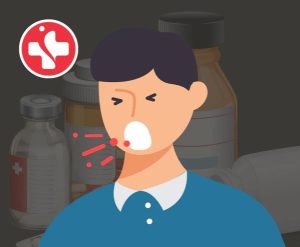WHAT DOES MY TYPE OF COUGH MEAN?
Coughing is your body’s way of getting rid of an irritant. When something irritates your throat or airway, your nervous system sends an alert to your brain. Your brain responds by telling the muscles in your chest and abdomen to contract and expel a burst of air.
A cough is an important defensive reflex that helps protect your body from irritants like mucus, smoke, and allergens such as dust, mold, and pollen.
Coughing is a symptom of many illnesses and conditions. Sometimes, the characteristics of your cough can give you a clue to its cause.
Coughs can be described by:
- Behavior or experience. When and why does the cough happen? Is it at night, after eating, while exercising?
- Characteristics. How does your cough sound or feel? Hacking, wet, dry?
- Duration. Does your cough last less than two weeks, six weeks, more than eight weeks?
- Effects. Does your cough cause related symptoms such as urinary incontinence, vomiting, or sleeplessness?
- Grade. How bad is it? Is it annoying, persistent, or debilitating?
Occasionally, your cough reflex is triggered by an obstruction in your airway. If you or your child has ingested something that could be blocking the airway, seek immediate medical attention.
Signs of choking include:
- Bluish skin
- Loss of consciousness
- Inability to speak or cry
- Wheezing, whistling, or other odd breathing noises
- Weak or ineffective cough
- Panic
- If you observe any of these signs, call for help immediately.
WET COUGH
A wet cough, also called a productive cough, is a cough that typically brings up mucus. Wet coughs are commonly caused by a cold or the flu. They can come on slowly or quickly and may be accompanied by other symptoms, such as:
- Runny nose
- Postnasal drip
- Fatigue
Wet coughs sound wet because your body is pushing mucus out of your respiratory system, which includes your throat, nose, airways, and lungs.
If you have a wet cough, you may feel like there’s something stuck or dripping at the back of your throat or in your chest. Some of your coughs will bring mucus into your mouth.
Wet coughs can be acute and last less than three weeks, or chronic and last longer than 8 weeks in adults or 4 weeks in children. The duration of a cough may be a big clue as to its cause.
Conditions that can cause a wet cough include:
- Cold or flu
- Pneumonia
- Chronic obstructive pulmonary disease (COPD), including emphysema and chronic bronchitis
- Acute bronchitis
- Asthma
- Coughs in babies, toddlers, and children that last less than three weeks are almost always caused by a cold or flu.
Remedies for a Wet Cough
Babies and toddlers.
- Treat with a cool-mist humidifier.
- Don’t give over-the-counter (OTC) cough or cold medication to babies or toddlers under the age of 2.
Children.
- A small clinical trial found that 1.5 teaspoons of honey given a half hour before bedtime reduces cough and encourages better sleep in children age 1 and older.
- Use a humidifier at night to moisten the air and talk with your doctor about OTC cough and cold medications before using them as a treatment.
Adults.
- Adults can treat acute wet coughs with OTC cough and cold symptom relieving medications or honey.
- If cough persists for longer than three weeks, antibiotic therapy or other treatments may be required.
DRY COUGH
A dry cough is a cough that doesn’t bring up mucus. It may feel like you have a tickle in the back of your throat triggering your cough reflex, giving you hacking coughs. Dry coughs are often difficult to control and may present in long fits. Dry coughs occur because there’s inflammation or irritation in your respiratory tract, but no excess mucus to cough up.
Dry coughs are often caused by upper respiratory infections, such as a cold or the flu. In both children and adults, it’s common for dry coughs to linger for several weeks after a cold or flu has passed. Other possible causes of dry cough include:
- Laryngitis
- Sore throat
- Croup
- Tonsillitis
- Sinusitis
- Asthma
- Allergies
- Gastroesophageal reflux disease
- Medications, especially ace inhibitors
- Exposure to irritants such as air pollution, dust, or smoke
Remedies for a Dry Cough
Babies and Toddlers.
- In babies and toddlers, dry coughs typically don’t require treatment.
- A humidifier can help make them more comfortable.
- To treat croup breathing, bring your child into a bathroom full of steam or outside in the cool night air.
Older children.
- A humidifier will help keep their respiratory system from drying out.
- Older children can also use cough drops to soothe sore throats.
- If their condition continues for more than three weeks, talk with your doctor about other causes.
Adults.
- A chronic, long-lasting dry cough in adults can have many possible causes.
- Tell your doctor about symptoms such as pain and heartburn.
- Let your doctor know about all medications and supplements that you’re currently taking.
WHEN TO SEE A DOCTOR
Many coughs don’t require a Doctor’s visit. It depends on the type of cough and how long it’s lasted, as well as a person’s age and health. People with other diseases of the lungs, such as asthma and COPD, may require treatment sooner or more frequently than others.
You should contact your Doctor if you
- Have a cough for more than three weeks
- Have a fever above 102°f (or any fever in children 2 months old or younger)
- Become so out of breath that they can’t talk or walk
- Are dehydrated or unable to swallow food
- Are extremely fatigued
- Make a “whoop” noise during violent coughing attacks
- Are wheezing in addition to coughing
- Have daily stomach acid reflux or heartburn, or cough in general, that interferes with sleep
The takeaway
There are many different types of coughs. The characteristics, duration, and severity of a cough may indicate the cause. Coughing is a symptom of many illnesses and could be caused by a variety of conditions.
Culled from www.healthline.com/health/types-of-coughs







